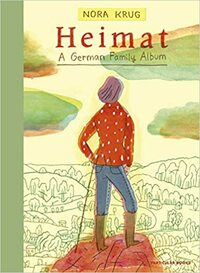Take a photo of a barcode or cover
How responsible are we for the actions of our ancestors? Can we still have pride in our heritage or our country if it was responsible for committing massive atrocities? Is there any point in feeling guilt over these histories, and what should we do in the present to both acknowledge our troubled history and ensure we move forward in a healing way? Krug raises all these issues as she explores her family’s history in Germany during the Holocaust. These questions echo those in the U.S. as well: what responsibility do we today hold for the past atrocities of Native American genocide and African enslavement? How do you right the wrongs of the past, especially when they are still impacting people today?
Wallowing in guilt seems largely unproductive. But an honest reckoning with one’s past, looking it full in the face, does seem necessary. Krug waffles between the two: she is searching for her family’s truth in a foggy past, and it is clear that she struggles with guilt and blame. She hopes for reasons for her relatives’ wartime behaviors, she wants justifications, but in the end reaches a point where she just has to accept that she will never completely know her ancestors’ motivations.
At its core, this graphic novel is a simple family history investigation, uncovering stories, photographs, and documents that paint a picture. Some parts of the picture are clearer than others, and this is conveyed through both text and the artistic style of the book. I thought this worked very well as both a personal story and a more general commentary on how we deal with our shared history. Not that Krug’s approach is perfect: her search for family absolution frequently overshadows the horrors that took place in her families’ hometowns. She does make some effort to discover what happened to the Jewish people in those towns, but at least one of the documents she shared seems to reveal the extent to which the residents practiced selective amnesia. And her focus is definitely on her own family. It’s a hard balance to find, but there are many other books that deal in the depths of human cruelty during the Holocaust. This focuses more on the human impulse to deny responsibility or even just human indifference.
In that light, I found this an incredibly worthwhile read. We don’t need to paint over history with a rosy glow, or with a shame-soaked gray fog. We need to face it honestly and with acceptance of reality. And there is another aspect to this as well: what kinds of suffering are we indifferent to right in this moment that we will be tempted to claim we didn’t see and our grandchildren will anxiously inquire about our involvement in? History is always more relevant than we’d like to think.
Wallowing in guilt seems largely unproductive. But an honest reckoning with one’s past, looking it full in the face, does seem necessary. Krug waffles between the two: she is searching for her family’s truth in a foggy past, and it is clear that she struggles with guilt and blame. She hopes for reasons for her relatives’ wartime behaviors, she wants justifications, but in the end reaches a point where she just has to accept that she will never completely know her ancestors’ motivations.
At its core, this graphic novel is a simple family history investigation, uncovering stories, photographs, and documents that paint a picture. Some parts of the picture are clearer than others, and this is conveyed through both text and the artistic style of the book. I thought this worked very well as both a personal story and a more general commentary on how we deal with our shared history. Not that Krug’s approach is perfect: her search for family absolution frequently overshadows the horrors that took place in her families’ hometowns. She does make some effort to discover what happened to the Jewish people in those towns, but at least one of the documents she shared seems to reveal the extent to which the residents practiced selective amnesia. And her focus is definitely on her own family. It’s a hard balance to find, but there are many other books that deal in the depths of human cruelty during the Holocaust. This focuses more on the human impulse to deny responsibility or even just human indifference.
In that light, I found this an incredibly worthwhile read. We don’t need to paint over history with a rosy glow, or with a shame-soaked gray fog. We need to face it honestly and with acceptance of reality. And there is another aspect to this as well: what kinds of suffering are we indifferent to right in this moment that we will be tempted to claim we didn’t see and our grandchildren will anxiously inquire about our involvement in? History is always more relevant than we’d like to think.
This is for the audio book.
I made a mistake. I briefly read the premise, saw the length, and determined that this would be better as an audio book, like listening to a short podcast series. I did not know there was an illustrated version and the illustrations seem to be one of the books strength. So, I admit this isn't a review of all versions of this work. However, it is a close look at the story, closer than one have if distracted by illustrations.
I have a degree in German, yet learned much about the German experience of WW2. She peels away her family history layer by layer, like one might peel layers of wallpaper from the wall of a house that has been passed on generation to generation. You feel like you learn about things when she learns about them. Its not melodramatic but suspenseful enough and well-paced to keep your interest.
Where the audiobook is hindered though is that its easy to be lost among the many German names and I have more of an ear for them than non-German speakers. I imagine the illustrations are necessary then to keep track of who is she is talking to, how they are related to her, and what she has already covered about them earlier in the story. I had to rewind and register to entire tracks because somewhere in the middle I was lost. There could be different music, sound-processing, or any other number of cues to help the listener but audio design just isn't there yet for this and any audiobook.
I also find her writing to be somewhat contrived and poetic-yet-hollow. The words and images sound nice but I fail to see what she is getting at or they simply feel very forced, such as near the end where she metaphorically expounds upon snow cover many times.
I made a mistake. I briefly read the premise, saw the length, and determined that this would be better as an audio book, like listening to a short podcast series. I did not know there was an illustrated version and the illustrations seem to be one of the books strength. So, I admit this isn't a review of all versions of this work. However, it is a close look at the story, closer than one have if distracted by illustrations.
I have a degree in German, yet learned much about the German experience of WW2. She peels away her family history layer by layer, like one might peel layers of wallpaper from the wall of a house that has been passed on generation to generation. You feel like you learn about things when she learns about them. Its not melodramatic but suspenseful enough and well-paced to keep your interest.
Where the audiobook is hindered though is that its easy to be lost among the many German names and I have more of an ear for them than non-German speakers. I imagine the illustrations are necessary then to keep track of who is she is talking to, how they are related to her, and what she has already covered about them earlier in the story. I had to rewind and register to entire tracks because somewhere in the middle I was lost. There could be different music, sound-processing, or any other number of cues to help the listener but audio design just isn't there yet for this and any audiobook.
I also find her writing to be somewhat contrived and poetic-yet-hollow. The words and images sound nice but I fail to see what she is getting at or they simply feel very forced, such as near the end where she metaphorically expounds upon snow cover many times.
emotional
hopeful
reflective
sad
medium-paced
Did not finish. I just couldn't connect to this story. It was supposed to be a story of personal reckoning, but it was a little too methodical to connect to emotionally. There were insert pages placed right in the middle of a story instead of bookending chapters. Not for me
I know now what I didn't know before: that HEIMAT can only be found again in memory, that it is something that only begins to exist once you've lost it.
challenging
emotional
informative
inspiring
reflective
medium-paced
emotional
informative
inspiring
reflective
fast-paced
I promised myself I wouldn't read wwii content anymore, but this was recommended by a good friend. It's visual, no traditional format made it very palatable, and a quick read that I couldn't put down. Beautifully crafted. I wish I could give it more stars.
discovered this book with the same title as my thesis collection in a stack at the abbey! it’s a really careful and creative multimedia autobiography about growing up in germany only two generations removed from the holocaust. i also went to the mémorial de la shoah today in paris, which added a lot to my reading experience
This is an absolutely incredible examination of what it means to be German after World War II. She traces her own family’s activities before and diring the war. So powerful and intense. This should be read by everyone with an interest in Germany or World War II.
An illustrated memoir from Krug, who explores her family's past to found out the extent of their complicity with Nazism. Recommended.




